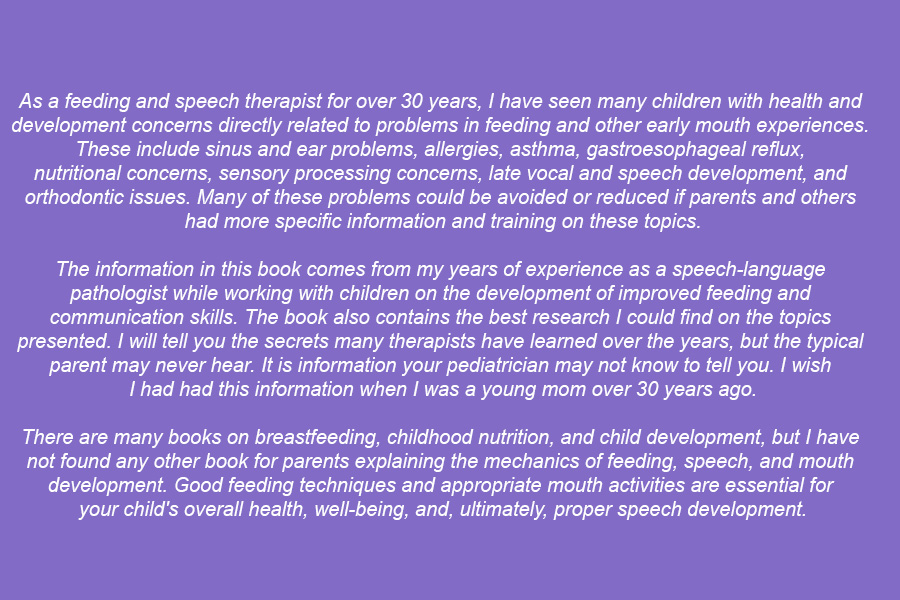-- FORWARD --
Awareness is the first step toward change. Through the eye of awareness, parents and professionals first gain an understanding of how a process such as the development of feeding skills unfolds. Awareness without judgment enables them to apply general knowledge and observation to specific children and make better decisions.
Infants and young children are highly resilient. Most have the internal sensory and movement abilities to adjust to feeding situations that are less than ideal. They learn to eat and drink in spite of irregular schedules, poor positioning for nursing, spoons that are too large, or food textures that are too challenging for their current experience and skills. They may struggle or protest, but eventually they learn because taking in enough food and liquid is essential to life and survival.
Some children are born with poorer coordination, a high level of sensitivity to their environment, allergies, or structural difficulties that make eating and drinking exceptionally challenging. Some babies and toddlers, such as those born prematurely, simply need more time and greater adult guidance to develop these skills. When they are offered eating challenges that are too difficult or experience foods or feeding utensils that don’t fit their current needs, they may become discouraged or frustrated; some may even refuse to eat whole categories of food or reject the spoon or cup because they associate it with discomfort or failure.
This is a book that builds awareness. Diane Bahr asks the simple question: “Do children learn more easily when parents understand their needs and the significance of the various stages of development?” Her answer is a clear “yes”. Many parents worry that something is wrong with a child when their baby doesn’t do things that they remember an older brother or sister doing at the same age. They become fearful that their baby will never be able to chew or drink from a cup. If there are feeding difficulties someone may tell them that their child will be delayed in speech development. When parents are afraid, their emotions get in the way of their ability to connect lovingly with their child. They may pull back from the relationship in their concerns about the baby’s development. Their own stress levels can make it harder for their youngster to move freely into newer skills.
This is a book about babies and young children. It is secondarily about how their mouths and faces develop for feeding and early speech. It is a book about parents and their desire to support their child’s natural development. It provides guidance that enables parents to understand their baby’s development of feeding and to see it in relationship to everything else that the baby is doing. It can assure them that their baby is developing in the same way as other infants, setting his own pace and timing in learning something new. It also gives them ways to observe and understand when feeding and speech development have become stuck and their baby doesn’t seem to be moving to the next level. When feeding and speech are not progressing well, the book offers suggestions that parents can incorporate into their daily lives and describes various professionals and other resources that can help them.
Suzanne Evans Morris, Ph.D. (Bahr, 2010, p. xv)

